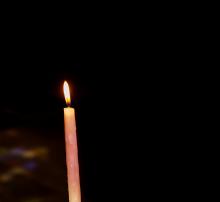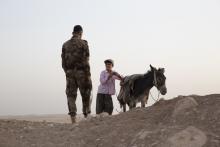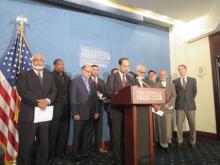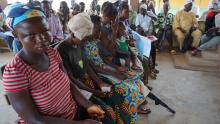isis

With each bloody act, Islamic State militants demonstrate their need for self-importance overrides any moral, ethical, or religious boundary. Peter Kassig’s beheading is a microcosm of all the Islamic State wants, and religion is not high on that list.
Kassig converted to Islam and took the name Abdul-Rahman, servant of the Merciful. By many accounts, his conversion was genuine and the result of the love he felt for the people he met while providing aid in Syria. His former military service could have made him reluctant to return to a region in conflict. Instead, he chose to go back and help people, risking his life to do so.
In comparison, the Islamic State exacerbates a worsening humanitarian crisis in Syria. It works to prevent aid workers like Kassig from doing their job. A broken population that has no hope is the best recruiting environment it can hope for. If Syrians get aid from Americans, it would destroy the narrative that Islamic State militants are caring for Muslims.
The Islamic State specializes in media manipulation. It uses videos of its executions to gain a response from more powerful adversaries, thus giving it more legitimacy. The world “Islamic” ties the group to something grander than political machinations and 15th-century wars. Its video game-style recruitment material exhibits a mastery of the language of modernity.
Ultimately, the group is a product of modernity, not religion.

Thank the gods we don’t believe in the utterances of oracles anymore. We don’t search for omens in the entrails of sacrificed animals or believe that women in drug-induced trances can foretell our destiny. Because the ancient Greeks fell for this superstitious mumbo jumbo, they were led into two disastrous wars that had devastating consequences. The great anti-war playwright Euripides offers his critique of wars and oracles in his play, Iphigenia at Aulis, now playing at the Court Theater in Chicago. My talented friend Jeanne T. Arrigo is in the chorus of this production and I have her and the Court Theater to thank for bringing this ancient gem to my attention.
Two Oracles, Two Devastating Wars
Iphigenia at Aulis was first performed a year after Euripides’ death in 406 B.C.E. He wrote it in response to Athens’ nearly 30-year war against Sparta. Known as the Peloponnesian War, it ended in 404 B.C.E. with Athens’ surrender, her fleet destroyed, and the city starving after a four-month siege. Euripides felt that part of the reason Athens went to war in the first place was that the Oracle at Delphi had predicted victory “if they did their best.” Not only did this encourage the outbreak of the war, but it probably made a negotiated settlement impossible. Because why would anyone cease the pursuit of victory if victory has been assured? The Oracle’s prophecy lent an aura of inevitability to the outcome of the war, which in effect robbed the Athenians of their agency. They marched to war like automatons in service of the gods.
To convince Athenians that they were on a path of self-destruction, Euripides dramatized a scene from the beginning of a previous bad military adventure, the Trojan War. As the Homeric story is retold by Euripides, the Greek armies are assembled in the port city of Aulis. Agamemnon is their general, ready to lead a thousand ships to attack Troy to recover Helen, who has run off with young Paris of Troy. The nation has mobilized to avenge this insult to Helen’s husband, Menelaus (Agamemnon’s brother) and all of Greece.
Unfortunately for Agamemnon, there is no wind. The soldiers soon tire of waiting and, despite their war lust, they are threatening to go home. But an Oracle has foretold that Artemis will raise the winds and bring certain victory on one condition: that Agamemnon sacrifice his daughter Iphigenia to her. Under pressure from the troops and his own lust for glory, Agamemnon sacrifices his daughter and the thousand ships are launched. The war is on, and the play ends with the fleet sailing eagerly across the sea.

ISIS terrorist rampages, waves of anti-Muslim hate speech and fear-mongering Islamophobia are inspiring an outburst of online activism in the form of Twitter hashtags.
The question is: Does it work, especially over the long term?
An army of “clicktivists” — a mix of earnest advocates and pointed satirists — has entered the fray armed with 140-character positive, peaceful or humorous counter-messages.
Using names such as #TakeOnHate, #IStandUpBecause, and #NotInMyName, the pushback approach promotes the complexity, diversity and positive contributions of Islam and Muslims. Others, such as #MuslimApologies, offer sarcasm in service of the same message.
Yet the hashtags are often immediately co-opted by trolls spewing an opposite message. And some experts question whether clicktivist campaigns have lasting worth.
Linda Sarsour has no doubt they do. She’s a Brooklyn-based Palestinian activist in the streets and on social media and a co-creator of #TakeOnHate. The hashtag is accompanied by a resource website, launched in March by the National Network for Arab American Communities.
“The insidious thing about anti-Arab hate speech is that it seems to be acceptable, where the ‘N-word’ or anti-Semitic remarks are not taken with the same degree of outrage,” said Sarsour, who was chased down the street in September by a man who was later arrested for threatening to behead her.
Six weeks after ISIS overtook their village outside of Mosul, Iraq, Sief and Jacob Jebrita said they received an official cease and desist letter from the terrorist group saying their work was forbidden under Islamic law. The two brothers, partners in a small photography and videography business, lost their sole source of income. But that was just the beginning.
Sief and Jacob shared their story while sitting in St. Mary, Mother of the Church in Amman, Jordan, with a delegation of religious media. The church, led by Fr. Khalil Jaar, has become home to more than 150 Iraqi Christian refugees who have fled their homes while ISIS continues to push through the region.
Because of their Christian faith, Sief, Jacob, and their families were targeted by ISIS. They told me of a soldier ripping an earring out of a girl’s ear, slicing it open because it was not acceptable for her to wear jewelry. As ISIS militants forced people out of their homes, they would not allow them to bring anything with them at all except the clothes on their backs. They told me the story of one mother walking with her little boy who was forced to leave behind his bottle of milk after a soldier knocked it to the ground and shouted at them. As the situation worsened, they said they saw Yazidi men killed for refusing to accept Islam, and Yazidi woman sold into slavery in Mosul – $500 for younger women and $100 to $300 for older women.

In the wake of the latest escalation of the U.S. “war on terror,” it’s time to remember the origin of Veterans Day. In 1926, Congress officially recognized the commemoration of Armistice Day on Nov. 11 with the exhortation, “the recurring anniversary of this date should be commemorated with thanksgiving and prayer and exercises designed to perpetuate peace through good will and mutual understanding between nations.” Armistice Day commemorated the day when World War I hostilities ceased, and had been celebrated informally since 1919 as a day to work for peace.

While the world’s attention is firmly fixed on the Islamic State’s continued rein of terror, applause for Malala Yousafzai — for taking home the Nobel Peace Prize — has taken on a quieter tone. Yet, her message — that girls can turn the tide against religious radicalism and repression — risks being lost.
In another part of the world, reports continue to trickle in of the failed negotiations between the Nigerian government and Boko Haram — negotiations that were supposed to include provisions for release of the more than 200 Nigerian schoolgirls who remain firmly within Boko Haram’s grip. In fact, there are new reports that another 20 to 70 women and girls have become the latest victims of Boko Haram’s terror, threatening the cease-fire that was to bring the original schoolgirls home. Moreover, much of the world is now eerily silent on the subject — calling into question the commitment to the return of the girls and undermining the separate campaign to improve the education of girls worldwide.
Is this Malala’s world? One where the value of female lives is an open question, and where the kidnapping of girls and women by terrorists goes unanswered? It certainly seems that way. The #bringbackourgirls campaign championed by first lady Michelle Obama and countless Hollywood stars is now a stagnant memory.
Compare this reality to the global push to educate the girls, an understood foundation for economic development and prosperity, with the paradox of the wholesale abandonment of the abducted girls, whose only crime was receiving this exact education.

LAST YEAR, as I was unpacking my son’s school backpack, I found the children’s book on the Prophet Muhammad that my wife and I read to him at night. He had brought it to school without telling us. “It was for show and tell,” he explained to me.
You might think that my first reaction would be happiness. One of my goals as a Muslim parent is to help my kids feel connected to their faith. Clearly my son felt close enough to his religion to bring a book on the Prophet to share with his class.
What I actually felt was a shock of fear shoot down my spine. It was an immediate, visceral reaction. A whole slew of questions raced through my head. What did his teacher think of Muslims? What about his classmates? Would somebody say something ugly or bigoted about Islam during my son’s presentation? Would his first taste of Islamophobia come at the age of 5 during show-and-tell?
My fear at that moment is one small window into what it feels like to be a Muslim-American parent at a time when Muslim extremism is on prominent display and Islamophobia in America continues to spread.

In Tuesday’s elections, most voters didn’t see their candidates as leaders. Americans are cynical about politics, exhibited by the broad-based discontent with both parties, the president, and Congress. Nearly two thirds of the electorate didn’t even vote — turnout this year was likely lower as a percentage of the electorate than any time since 1942. Negative campaign ads reached depressing lows, directly appealing to Americans’ fears and anxieties, and most people don’t think the results of the election will change political gridlock in Washington. This election campaign was a loss for the common good.
We seem to have become cynically resigned to politicians always blaming the other party for every problem instead of solving them and alleged political leaders pursuing a 24/7, 52-week strategy of winning instead of governing. There are no more off election years to make society better; every day and every decision is just a part of the next campaign.
The campaigns and the media coverage were all about polls, attacks, and sound bites. The Republican campaign message was simply: vote against President Obama. And the Democrats deserted him, wouldn’t discuss either his accomplishments or his failures, and had no message of their own that got through. The campaign wasn’t about the most important issues facing the country. Here’s what we should be talking about.

LIKE MUCH OF the world, I’ve been thinking quite a bit about ISIS over the past few months. I’ve been horrified by the accounts of the so-called Islamic State’s barbarism, and I lament their perversion of one of the world’s great religions.
Most of all, I’m outraged at their disregard for human life—at their wanton killing of Shia Muslims, Christians, Yazidis, and anyone else who doesn’t share their radical vision. Pope Francis has said that it’s legitimate to act to protect innocent lives in this case, and I don’t disagree with him.
Yet I believe that Jesus calls us to be peacemakers, which requires us to think beyond short-term military solutions and address the systemic issues that breed crises like this one. And I strongly believe that to have any moral authority in the current crisis, we must first confess the Western policies and attitudes that have contributed to where we find ourselves today—and then repent of those policies and attitudes.
The first thing we need to confess is a shallow and, at best, incomplete understanding of ISIS. Alireza Doostdar of the University of Chicago Divinity School wrote, “[We] seem to assume that ISIS ... has suddenly materialized out of the thin ether of an evil doctrine. But ISIS emerged from the fires of war, occupation, killing, torture, and disenfranchisement. It did not need to sell its doctrine to win recruits. It needed above all to prove itself effective against its foes.”

Basima al-Safar retouches a picture of Jesus on an easel outside her house overlooking the flat Nineveh plains, 30 miles north of Mosul.
The murals she paints tell the story of her people, Christians in Iraq. But with Islamic State militants nearby, she is worried that life in Alqosh and towns like it could soon come to an end.
The Assyrian Christian town of around 6,000 people sits on a hill below the seventh-century Rabban Hormizd Monastery, temporarily closed because of the security situation. Residents of Alqosh fled this summer ahead of Islamic State militants. Around 70 percent of the town’s residents have since returned. Still, a sense of unease hangs in the air.
Below the monastery in the boarded up bazaar a lone shopkeeper waits for customers. At the edge of town local Christian fighters staff lookout posts, checking for danger. With Islamic State fighters just 10 miles away, these men and most residents of the town are scared that they may have to flee again.

Rene Girard has a prophetic warning in his book Battling to the End about the West’s fight against Islamic jihadists:
The West is going to exhaust itself in its fight against Islamic terrorism, which Western arrogance has undeniably kindled.
That Western arrogance was on display last weekend on Real Time with Bill Maher. The tense debate about Islam between Bill Maher, Sam Harris, and Ben Affleck has been shared multiple times over social media and provides a case study in Girard’s mimetic theory.
One element that mimetic theory illuminates in this discussion of Islam is the scapegoat mechanism. Scapegoating is a non-conscious way of reinforcing a group’s relationship by blaming another group of people for our problems. The scapegoating mechanism is non-conscious because we always think that we are innocent and that our scapegoats are guilty. The video below shows a great example of the scapegoating mechanism when it comes to Islam. (Warning: It's an HBO show — there is some foul language.)

Whether ISIS is "Islamic," or a "state," it is definitely terrifying. As it terrorizes the Levant — killing Muslims, Christians, Jews, Yazidis, and other religious/cultural minorities in Syria and Iraq — and takes the lives of Western journalists, it strikes fear in the hearts of many.
Swirling around the alarming analysis are the rumors and realities of individuals from Europe and the U.S. joining the ranks of ISIS and fighting for their "cause."
The intelligence organization Soufan Group recently released a report stating that fighters from at least 81 countries have traveled to Syria since its three-year conflict began. Hundreds of recruits come from nations like France, Germany, the UK, and the U.S.
Of all the fearful intimations of this conflict, this feature seems to be the most frightening to many in the West. Could it be that my neighbor is a secret jihadi? Are redheads (a "pure" European stock) more prone to terrorism? Are mosques their hideouts? Regardless of the judiciousness of these questions, underlying them all is the question "why?" Why would someone leave the West to fight for ISIS in Syria and Iraq?
According to the Soufan report, those that leave for the Middle East to fight are typically 18-29 year-old men (some as young as 15) and some Western women who join with their spouses, or come alone to become "jihadi brides." These men and women are Islamic, often second or third generation immigrants, though very few have prior connections with Syria.
Why do they join? Is it religious devotion? Psychological imbalance? Tendency toward radical movements and anarchy? All of these motivations may play a part, but my argument is that these men and women who leave their Western homes for the dunes of terror are lonely.
These Western jihadis are isolated — that is why they join ISIS.

I write this essay on the eve of a US led air campaign that marks “the biggest direct military intervention in Syria since the crisis began more than three years ago.” There is no denying that ISIS/ISIL has captured the attention of the world through its religiously inspired acts of violence. The atrocities committed in recent months by ISIS/ISIL have left countless people of faith—including many devout Muslim leaders across the world—speechless.
Yet, one of the central aspects of religiously inspired violence is that it rails against silence. Whether it is Christian violence in Nigeria and Uganda, Hindu violence in Western India, Jewish violence in Gaza, or Islamic violence in Indonesia and Syria, acts of terror demand denunciation. The ubiquity of religiously inspired violence across cultures and religious traditions lends credibility to the belief of some that religion itself is the problem. My own Christian tradition treats our inclination to harm and even kill one another as symptomatic of our fallen natures; it is a mark of our propensity to evil. This is what makes religious violence so pernicious: it twists our one remedy so that it exacerbates the disease.
Violence—whether it arises out of a Quentin Tarantino film or a YouTube video of decapitation—captures our attention. Even as we are repulsed by the scope of human depravity, such acts of violence consume our attention. Scenes of violence are like a mirror into the darkest parts of our soul: we cannot bear the images we see, but neither can we turn away.

More than 120 Muslim scholars from around the world joined an open letter to the “fighters and followers” of the Islamic State, denouncing them as un-Islamic by using the most Islamic of terms.
Relying heavily on the Quran, the 18-page letter released Sept. 24 picks apart the extremist ideology of the militants who have left a wake of brutal death and destruction in their bid to establish a transnational Islamic state in Iraq and Syria.
Even translated into English, the letter will still sound alien to most Americans, said Nihad Awad, executive director of the Council of American-Islamic Relations, who released it in Washington with 10 other American Muslim religious and civil rights leaders.
“The letter is written in Arabic. It is using heavy classical religious texts and classical religious scholars that ISIS has used to mobilize young people to join its forces,” said Awad, using one of the acronyms for the group. “This letter is not meant for a liberal audience.”
Even mainstream Muslims, he said, may find it difficult to understand.

Here at Sojourners we have written a lot about nonviolence. We take seriously the words of Jesus that we should love our enemies and pray for those who persecute us. We believe that violence begets violence, or as Jesus put it, “Those who live by the sword die by the sword.” Personally, I take seriously the words of René Girard, the founder of mimetic theory, that we are now “confronted with a perfectly straightforward and even scientifically calculable choice between total destruction and the total renunciation of violence.”
Many Christians look to the Bible to justify divinely sanctioned violence against our enemies. Excuse me for stating the obvious, but Christians are not Biblians. We are Christians. As Christians, we should be putting Jesus first. Not Deuteronomy. Not Joshua. Not Judges. Not David. Not Solomon. Not Peter. Not Paul. Not the Bible.
Jesus first.
And Jesus calls us to nonviolence. As one of the early Christians stated, the way of Jesus, the way of nonviolent love that embraces our enemies, is the way of the cross and the world thinks that way is foolish.
We proclaim Christ crucified, a stumbling block to the Jews and foolishness to the Gentiles, but to those who are the called, both Jews and Greeks, Christ the power of God and the wisdom of God. For God’s foolishness is wiser than human wisdom, and God’s weakness is stronger than human strength.




The headlines and talk shows are dominated by the response ISIS. To be clear, this group readily uses fanatical and brutal actions to achieve its radically exclusive vision. The images they skillfully project are like violent, X-rated video games made real. No wonder that many react to this horror with chills going down their spines. But there is something that worries me more: the ongoing Ebola crisis.
How did ISIS come about? Sure, there’s huge complexity. Yet, we know that ISIS never would have emerged without, first of all, the U.S. invasion of Iraq and the ensuing, devastating war that left that nation in physical, political, and psychological shambles. Second, the sectarian, Shia-dominated regime, which emerged as the final U.S. ground troops left, further radicalized Sunni extremists. These factors were the breeding grounds for black-clothed fanatics ready to cut down any who differ with their identity, even if the majority of its victims are Muslims.
ISIS’s greatest recruiting tool is continued and renewed U.S. and Western military intervention in the Middle East. That, of course, is what their brutal actions are attempting to provoke. The moral callousness of this strategy inspires the fear which they desire and welcome.
However, ISIS can and will be contained. The neighboring regimes in the region are all deeply threatened by ISIS. In the end, they will be compelled to combat and resist ISIS the more these fanatics move out of the desert and toward others’ homelands. It will be bloody, but eventually other nation states and threatened sectarian groups, representing for the most part more mainstream and globally dominant expressions of Islam, will contain and defeat ISIS. The necessity and means of outside military assistance from the West and elsewhere is highly debatable, and at the end of the day, I don’t believe this will be the decisive factor.